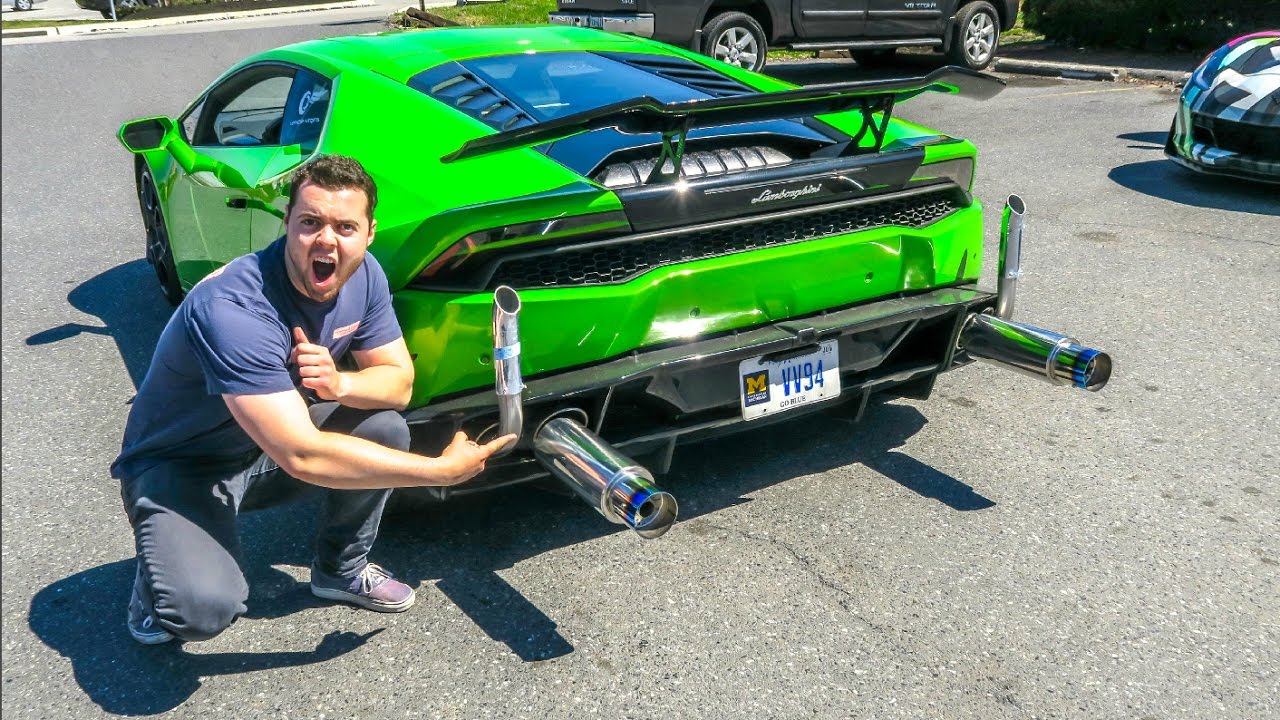

FAQs
Why Does My Car Fart
Published: July 31, 2023
Find answers to general questions about why your car farts and learn how to address this issue. Discover solutions to reduce emissions and improve performance.
(Many of the links in this article redirect to a specific reviewed product. Your purchase of these products through affiliate links helps to generate commission for Under-tec.com, at no extra cost. Learn more)
Table of Contents
Introduction
Have you ever noticed a strange noise coming from your car that sounds like a fart? You’re not alone. Many car owners have experienced this unusual phenomenon and wondered what could be causing it. It can be both embarrassing and concerning, especially when it happens in public or with passengers in the car. But fear not, because we’re here to uncover the mystery behind car farts and provide some insights on how to prevent them.
Car farts, also known as exhaust noises or backfires, can occur for a variety of reasons. While they may not always indicate a serious problem, it’s essential to understand the potential causes and impact they can have on your vehicle’s performance. In this article, we’ll delve into the science behind car farts, explore common culprits, and offer some solutions to prevent them.
So, what exactly causes a car to fart? To answer that question, we need to understand the science behind it. Don’t worry; we won’t get too technical. Put simply, car farts occur when there’s an imbalance in the combustion process, resulting in irregular or delayed ignition of the fuel-air mixture in the engine’s cylinders. This causes the fuel to ignite in the exhaust system, producing the distinctive popping or fart-like sound.
While car farts can be alarming, they don’t always indicate a serious problem with your vehicle. In some cases, they may be a normal occurrence, particularly with older cars or those equipped with performance exhaust systems. However, excessive or persistent car farts can be a sign of underlying issues that require attention. It’s crucial to identify the root cause and take appropriate measures to prevent further damage.
Not only can car farts be embarrassing, but they can also have an impact on your vehicle’s performance. When your car farts, it disrupts the smooth flow of exhaust gases, potentially leading to decreased engine efficiency and power. Additionally, it can put stress on various components of the exhaust system, such as the catalytic converter, causing premature wear and potential damage. Therefore, it’s important to address the issue proactively to maintain optimal performance and protect your investment.
What Causes Car Farts?
Now that we understand the basic science behind car farts, let’s dive into some specific factors that can cause this unusual phenomenon. While there can be multiple reasons for your car emitting fart-like noises, here are some common culprits:
- Fuel Mixture Issues: One of the primary causes of car farts is an imbalanced fuel-air mixture in the engine’s cylinders. If there’s too much fuel or not enough air, the combustion process becomes irregular, leading to backfires in the exhaust system.
- Ignition Timing Problems: Incorrect timing of the ignition spark can disturb the combustion process, resulting in car farts. This can occur due to faulty ignition timing components or issues with the engine’s electronic control module (ECM).
- Exhaust System Leaks: An exhaust system leak can allow oxygen to enter the exhaust gases, leading to irregular combustion and causing the infamous fart-like sound. Leaks can occur at various points in the exhaust system, including the manifold, gaskets, or even the muffler.
- Malfunctioning Catalytic Converter: A failing or clogged catalytic converter can disrupt the exhaust flow and cause backpressure, leading to car farts. This is more likely to happen in older vehicles or if the catalytic converter is damaged or deteriorated.
- Intake or Exhaust Valve Issues: If the intake or exhaust valves are not functioning correctly, it can disrupt the air-fuel mixture and cause irregular combustion, resulting in car farts. Valve-related problems can occur due to wear and tear, carbon buildup, or faulty valve seals.
It’s important to note that these are just some common causes of car farts, and there can be other factors contributing to the issue. Additionally, the severity and frequency of car farts may vary depending on the specific circumstances and condition of your vehicle. If you’re experiencing excessive or persistent car farts, it’s advisable to consult a qualified mechanic to diagnose and address the underlying problems.
Understanding the Science Behind It
To truly grasp the science behind car farts, it’s important to understand the combustion process that takes place in your vehicle’s engine. When you start your car, the fuel-air mixture is ignited by the spark plug, resulting in a controlled explosion that generates power to move the vehicle forward. This combustion process produces exhaust gases that are expelled through the exhaust system.
Under normal circumstances, the combustion process is smooth and efficient, with the ignited fuel-air mixture burning completely in the engine’s cylinders. However, several variables can disrupt this process, leading to the formation of car farts.
One of the main reasons for car farts is an imbalance in the fuel-air mixture. To achieve optimal combustion, the ratio of air to fuel needs to be within a specific range. When this ratio becomes imbalanced, such as having too much fuel or not enough air, the combustion becomes irregular. Instead of the fuel-air mixture burning completely in the cylinders, unburned fuel ends up in the exhaust system. When this unburned fuel comes into contact with hot surfaces, either due to lingering heat or a misfire, it ignites, resulting in a backfire or a fart-like sound.
Another factor that can contribute to car farts is the timing of the ignition spark. The spark plug needs to ignite the fuel-air mixture at the precise moment for optimal combustion. If the ignition timing is off, either due to a fault in the ignition system or an issue with the engine’s electronic control module, the combustion process can be disrupted. This disruption can cause the fuel to ignite in the exhaust system, producing the characteristic popping or fart-like sound.
Furthermore, problems in the exhaust system itself can also lead to car farts. Any leaks in the exhaust system can introduce oxygen into the exhaust gases, which can interfere with the combustion process. The oxygen reacts with the unburned fuel, causing it to ignite prematurely in the exhaust system, resulting in car farts. Leaks can occur at various points in the system, such as the manifold, gaskets, or even the muffler.
Understanding the science behind car farts helps us realize that they are often symptomatic of an underlying issue. While they may not always indicate a serious problem, it’s important to investigate and address the root cause to ensure the proper functioning of your vehicle.
Common Culprits of Car Farts
Car farts can be caused by various factors, and identifying the specific culprit can help address the issue effectively. Here are some common suspects when it comes to car farts:
- Fuel Mixture Imbalance: As mentioned earlier, an imbalanced fuel-air mixture can lead to car farts. This can occur when there is too much fuel or not enough air in the combustion process. Factors like a malfunctioning fuel injector, a clogged air filter, or a faulty oxygen sensor can contribute to this imbalance.
- Ignition System Problems: Issues with the ignition system, such as a faulty spark plug or ignition coil, can disrupt the timing and intensity of the spark, leading to irregular combustion. This can cause car farts and may indicate the need for ignition system maintenance or replacement.
- Exhaust System Leaks: Leaks in the exhaust system can introduce oxygen into the gases, affecting the combustion process. Common culprits of exhaust leaks include cracked or damaged exhaust manifolds, worn-out gaskets, or holes in the muffler. These leaks can result in car farts and should be repaired promptly.
- Catalytic Converter Issues: The catalytic converter plays a critical role in reducing emissions by converting harmful gases into less harmful ones. However, a failing or clogged catalytic converter can disrupt the exhaust flow, leading to backpressure and car farts. If you suspect an issue with your catalytic converter, it’s important to have it inspected and repaired or replaced if necessary.
- Intake or Exhaust Valve Problems: Malfunctioning valves can affect the air-fuel mixture and disrupt the combustion process, resulting in car farts. Valve issues can be caused by wear and tear, carbon buildup, or faulty valve seals. Regular maintenance and inspections can help identify and address valve-related problems.
It’s worth mentioning that these are just a few common culprits of car farts, and there can be other factors contributing to the issue. Additionally, the severity and frequency of car farts may vary depending on the specific circumstances and condition of your vehicle. A thorough inspection by a qualified mechanic can help pinpoint the exact cause of the car farts and determine the appropriate course of action.
Impact of Car Farts on Vehicle Performance
While car farts may seem like a minor annoyance, they can actually have an impact on your vehicle’s performance. Here are some ways that car farts can affect your vehicle:
- Reduced Engine Efficiency: Car farts can disrupt the smooth flow of exhaust gases, leading to decreased engine efficiency. When the combustion process is not optimized, it can result in reduced power output and lower fuel efficiency. This means that your car may not perform as well as it should, and you may experience a decrease in acceleration and overall engine performance.
- Power Loss: As car farts interfere with the combustion process, they can cause a loss of power. This is particularly noticeable during acceleration or when climbing uphill. The irregular combustion can result in a less efficient transfer of power from the engine to the wheels, leading to a decrease in overall performance.
- Exhaust System Damage: Car farts can put additional stress on various components of the exhaust system, such as the catalytic converter, muffler, and exhaust manifold. The irregular combustion and the resulting backfires can cause premature wear and potential damage to these components. Over time, this can lead to costly repairs or the need for replacements.
- Increased Emissions: Car farts can also contribute to increased emissions, as the irregular combustion can result in unburned fuel being released into the atmosphere. This means that your vehicle may be generating more pollution than it should, leading to environmental concerns and potential legal issues in areas with strict emissions regulations.
- Overall Driveability Issues: Persistent car farts can make driving less enjoyable and more frustrating. The fart-like noises can be embarrassing, and the accompanying loss of power can make your daily commute or long trips less comfortable and enjoyable.
Given these potential impacts on your vehicle’s performance, it’s crucial to address car farts as soon as they become evident. Regular maintenance, including inspections of the ignition system, exhaust system, and fuel delivery system, can help identify and resolve any issues causing car farts. By taking proactive measures, you can ensure that your vehicle operates at its best and enjoy a smooth and efficient driving experience.
How to Prevent Car Farts
Experiencing car farts can be frustrating, but there are preventive measures you can take to minimize their occurrence. Here are some tips to help you prevent car farts:
- Maintain Regular Vehicle Maintenance: Keeping up with your vehicle’s regular maintenance is crucial in preventing car farts. Regularly inspect and replace worn-out spark plugs, ignition coils, and other components of the ignition system. Additionally, ensure that the fuel delivery system is clean and functioning properly, and schedule regular inspections of the exhaust system.
- Use High-Quality Fuel: Using high-quality fuel can make a significant difference in preventing car farts. Fuel with higher octane ratings ensures a more consistent combustion process, reducing the likelihood of irregular combustion and fart-like noises. Regularly clean or replace fuel filters to maintain fuel quality.
- Address Exhaust System Leaks Promptly: If you suspect any leaks in the exhaust system, it’s essential to address them promptly. Leaks can disrupt the combustion process and lead to car farts. Have your exhaust system inspected regularly, and repair any leaks or damaged components as soon as possible. This will help maintain proper exhaust flow and prevent irregular combustion.
- Ensure Proper Timing and Calibration: Regularly check and calibrate the timing of your ignition system. Faulty timing can contribute to car farts. If you’re not familiar with ignition system maintenance, it’s advisable to seek professional help to ensure accurate timing and calibration.
- Drive Responsibly: Aggressive driving or sudden accelerations can put additional stress on the engine and increase the likelihood of car farts. Drive responsibly, avoid excessive revving, and allow your engine to warm up properly before pushing it to higher RPMs.
By following these preventive measures, you can minimize the occurrence of car farts and ensure your vehicle’s optimal performance. However, if you continue to experience persistent or severe car farts despite taking preventive actions, it’s recommended to consult a qualified mechanic. They can perform a thorough inspection, diagnose any underlying issues, and provide the necessary repairs or replacements.
Conclusion
Car farts may be amusingly named, but they can be both embarrassing and indicative of underlying issues with your vehicle. Understanding the causes and potential impacts of car farts is essential for maintaining optimal vehicle performance and preventing further damage to your vehicle’s components. By addressing the root causes of car farts, you can not only eliminate the uncomfortable noise but also improve the efficiency and longevity of your vehicle.
If you experience car farts, it’s recommended to take proactive measures such as maintaining regular vehicle maintenance, using high-quality fuel, addressing exhaust system leaks promptly, ensuring proper timing and calibration, and driving responsibly. These preventive steps can help minimize the occurrence of car farts and ensure a smoother and more enjoyable driving experience.
However, if you continue to encounter persistent or severe car farts, it’s advisable to seek the assistance of a qualified mechanic. They have the expertise to thoroughly inspect your vehicle, identify any underlying issues, and provide the necessary repairs or replacements.
Remember, car farts are more than just a comical noise. They are symptoms that shouldn’t be ignored. By taking the necessary steps to prevent and resolve car farts, you can keep your vehicle running smoothly and avoid potential complications down the road. So, don’t let your car’s farts linger; give your vehicle the attention it deserves and enjoy a hassle-free driving experience.










